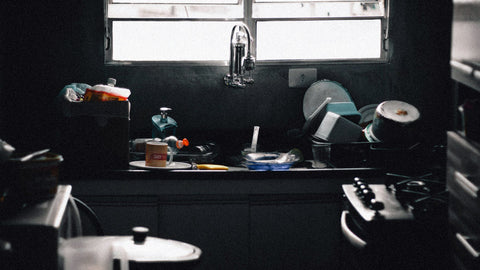Knives of all types must be regularly cleaned so that they stay rust-free, sharp, and free of bacteria. You should also use special care when handling them and keeping the knives clean.
Ultimately, it's best to clean and sanitize the knife after every use.
Cleaning a Kitchen Knife
Wipe the Knife Blade Clean After Use
If you let the debris stick on, the kitchen knives are harder to clean. Once you use it, run your knife underwater to get rid of food and debris. You can also wipe it down with a paper towel, dish towel, or sponge. Make sure you go the length of the whole blade when you wipe.
Then, set it aside until you choose to do dishes.
Make Sure the Blade Points Away
When you decide to clean the knife, use a mild solution of soapy water. Make sure that the cutting edge is pointed away from you to avoid any injuries.
Lather your sponge into the water. Have the blade point away and gently clean the knife to remove stains and food.
Don't scrub too quickly or vigorously. This could cause the knife to slip, and the blade could cut you. Appropriate knife care is crucial to prevent injuries.
Soak a Really Dirty Knife in Dish Soap
If food does get stuck on the knife, you can soak it in lemon juice or shallow water for a few minutes. Another good trick is to crumple a piece of aluminum foil and run it over just the blade. Don't get it on the wooden handle because that could cause damage.
You never want to use harsh chemicals because that could cause the blade to rust. To prevent rust, never use steel wool. Instead, if there's gunk stuck between the handle and blade, you can use a cotton swab or a soft rag to take care of it.
Dry the Knife
You should use a dry towel to wipe the blade to dry the knife. Don't air dry, as this could cause rust on the blade. Ultimately, you don't want the knife to sit out for an extended period, such as a few hours, while wet.
Cleaning a Pocket Knife
Wear Rubber Gloves
When you clean a pocket knife, make sure to wear rubber gloves. That way, you don't get cut. Plus, you might use mineral oil and cleaners that could irritate the skin. You can get them at a hardware store or supermarket.
Gather the Materials Needed
It's important to have the right supplies to clean pocket knives. Make sure they are all lined up and ready to go.
Initially, just use mild detergent, and always stay away from dishwasher detergent because it's too harsh on the pocket knife and might cause damage.
You may want to use household oil to remove rust, but WD-40 works well, too.
A toothbrush and clean cloth are also necessary. If there's rust, a nylon pad can be beneficial.
Fully Open the Knife
If it's a folding knife, make sure that you open it completely and engage the locking mechanism. A Swiss Army knife might have various utensils, and they should all be opened.
Use compressed air to remove dust and debris. You may also require an old toothbrush to get into the crevices of the pocket knife.
Scrub with Dish Detergent
Spot clean your knife with regular dish soap and a sponge. Make sure that you're using warm water.
Alternatively, you can try the baking soda method. Create a baking soda paste with white vinegar to dissolve any stuck-on bits. Just remember: it should be a thick paste.
Remove Any Rust
If you've got a rusty blade, you should use a household lubricant to remove the rust. Spray those rusty areas and let it sit for a minute. Then, scrub the blade, removing the rust. Typically, this works best for light rust.
Dry and Lubricate the Knife
Dry the carbon-steel knife with a clean, dry cloth. Steel blades shouldn't be left out in the air when wet. Add a few drops of vegetable oil or sewing machine oil to the knife. You just want a light coat and should remove excess oil with a cloth. Remember: carbon-steel knives always require lubricant!
Conclusion
Most people buy stainless steel knife blades because they work well and tend not to rust. However, you're sure to have dirty knives when you use them to cut meat and food. There are so many different styles out there, so it's crucial to learn about cleaning knives thoroughly and removing rust.
If you don't want to buy a new knife every few months, it's best to clean the ones you have. Follow these steps, and you're sure to have shiny utensils that can be used over and over again.
Plus, you can use these steps to deal with pocket knives. That way, you never have to worry about them not opening or working correctly!
